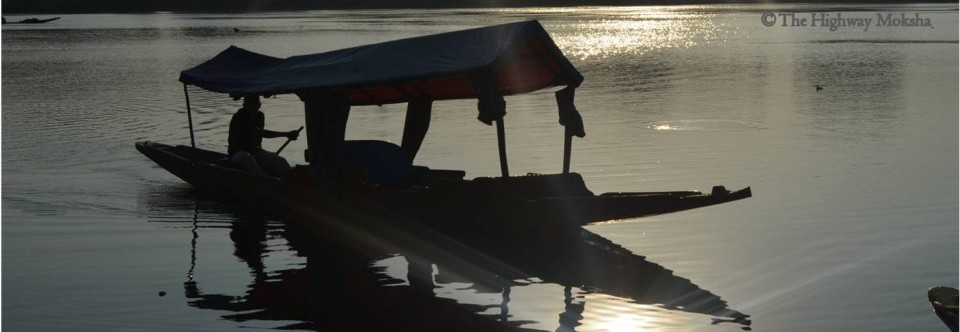Tags
artisans, clay, D5100, Durga Puja, environment, featured, ferry, Hooghly river, idols, Kolkata, Kumartuli, photography, straw, travel, wanderlust
As a wanderer, I have been to places that have made me squeal in happiness, and others that have silenced me in awe. Places that make the camera junkie in me go shutters(!), and others that render me motionless. But at times, I have chanced upon places that have made me experience all of that at once – placed that have rendered me speechless!
Kumartuli, Kolkata. Where forms are fashioned out of clay. Where life is infused and mere figures spring to life. A part of the vast city of Kolkata, Kumartuli lies close to the banks of the mighty Hooghly.  Alighting from the evening ferry, I found myself walking along a halogen lit narrow road, hedged in by the massive river on one side and a railway line on the other. I passed by heaps of discarded idols of the gods and goddesses and their ‘flesh and bones’ – clay and straw – as they lingered in a deathly silence under halogen lights, just on the banks of the mighty Ganges, a dive away from immortality!
Alighting from the evening ferry, I found myself walking along a halogen lit narrow road, hedged in by the massive river on one side and a railway line on the other. I passed by heaps of discarded idols of the gods and goddesses and their ‘flesh and bones’ – clay and straw – as they lingered in a deathly silence under halogen lights, just on the banks of the mighty Ganges, a dive away from immortality!
As a freight train shunted past, and shook the otherwise silent locality, I crossed the tracks as the sky turned a deep indigo color, to find myself in a neighborhood that seemed to be straight out of the 1700s! Crumbling walls of multi-storeyed houses that seemed to hold within stories of the generations since, and many layers of cement and poverty without. The doors seemed to offer the proud and yet vulnerable resistance of a poor man that wears his pride on his barely there sleeves.
Venturing in, the houses gave way to many shacks and hutments that housed the famed Kumartuli – where Goddess Durga came to life – each year!  Sweating and laboring men and women, working their skilled hands and feet tirelessly under the warm glows of either overhead, or at times distant bulbs and tubelights. Skills – and poverty – handed down over generations.
Sweating and laboring men and women, working their skilled hands and feet tirelessly under the warm glows of either overhead, or at times distant bulbs and tubelights. Skills – and poverty – handed down over generations.
Straw skeletons lie in storage houses, at times behind iron bars, and for the world to walk in, in others. I find myself peering at mysterious iron moulds that take me through time and geographies – moulds of Durga juxtaposed against that of a gladiator’s!
I observe in wide-eyed awe as women transform lumps of clay into the animal companions of the gods and their patron musical instruments, and men work on thermocol sheets – to create the timeless daaker shaaj to adorn the beloved goddess.
And heaps of clay taken from the river wait to be blended with wheat chaff – a hardy blend – by two pairs of legs belonging to sweating bodies as they skillfully knead the mound.
At another bend, I gape in wonder as a few men drape a beautiful Benarasi silk saree over a petite but fierce Goddess Kali. She radiates a strange combination of demureness and belligerence. May be this is what feminine grace is all about!
As I wander about through the dark and narrow lanes of Kumartuli lined by huts and shacks, and crumbling godowns, I find myself questioning. I see poverty and yet, I see that its travails weren’t enough to malign the beauty within the artisans that went about giving faces to the most raw emotions of a culture, and laid them out to be celebrated fanatically by a people – the Bengalis (for the uninitiated!) – over a fortnight, every year. May be this is resilience. No, I think it echoes a lack of choice.
I hope there would come a time when society and the powers that be, take heed, and know – the importance of celebrating the human life over mounds of clay.





I have always loved experiencing the different cultures and festivals specific to different parts of our country. Got to learn so many new things today. Thank you for taking me along Deboshri – and, here’s adding some more power to your hope of celebration of human life as well! All your pictures are superb, complement your equally superb write-up so beautifully! 🙂
LikeLike
You’ve always been so forthcoming in your comments Arti. Thanks for such encouraging remarks.
Am so glad I could let you in on another world and hope you make it to Kumartuli yourself some time soon. Knowing you, it’s an understatement to say that you’ll love it! 🙂
LikeLike
Blog looks nice. I’m still trying to make a blog but it won’t be as professional as yours /: Keep on blogging 🙂
LikeLike